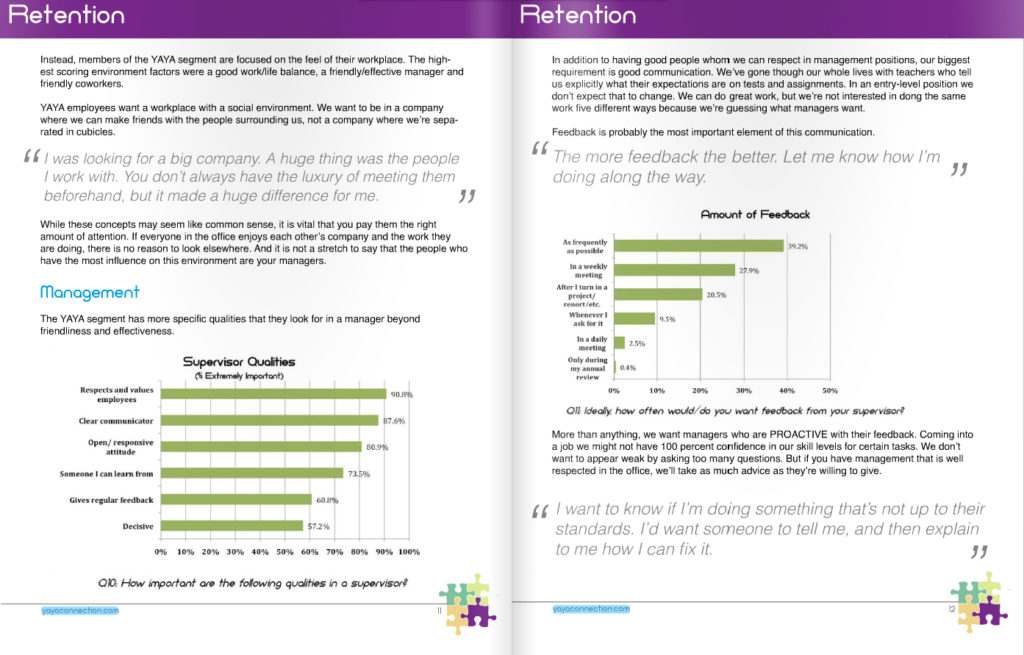
#RJInnovation (2012): How to attract and retain YAYA employees
Former Reynolds Fellow Stephanie Padgett, building on the work of another former Reynolds Fellow, Margaret Duffy, is working with top strategic communications students to identify strategies for businesses to effectively interact with Youth and Young Adults (YAYAs). YAYA Connection has worked with various clients to help them develop marketing strategies to engage the YAYA generation, a prime target for many businesses and industries.
As YAYAs enters the job market, employers are faced with the challenge of not just hiring quality young adults, but finding ways to keep them around. YAYAs are not known for their company loyalty, so this can be difficult.
Padgett, along with student members of Mojo Ad, discussed the best ways to attract and retain YAYA employees, using the results of a survey they conducted this semester.
Where do YAYAs look for jobs?
- The vast majority of YAYAs use their friends and family to find connections to jobs. They tend to feel more comfortable this way.
- Other popular techniques are company websites, job boards and career fairs.
- Only 31.4% of respondents cited LinkedIn as a place to look for jobs. While it’s a great tool, YAYAs don’t have the network or experience to show up on job searches.
- “I don’t really use LinkedIn. It’s one of those things like golf. I’m going to learn it one day, I swear I am, I just haven’t gotten around to it.” – Focus Group Member
Important Company Attributes:
Respondents were asked to rank the most important attributes they looked for when choosing where to work.
- The most important attribute was opportunities for career growth. While YAYAs understand that they will probably need to start at an entry-level position out of college, they want to work somewhere where the ability to work your way up to a higher position is available.
- The next most important attribute was the company’s management style. This group wants a manager and company personality that it feels it meshes with.
- Another important factor, although less of a priority, is the company’s location.
- If someone submits a resume that is perfect for the position but has no desire to live where the company is located, it’s not worth the time to interview them.
What benefits are important?
YAYAs were asked what the most important benefits were for a workplace to offer.
- Somewhat surprisingly, the most important benefits named were a healthcare plan and 401(k).
- While older generations tend to think YAYAs don’t plan for their future, this generation has seen economic decline and the problems with social security, and wants to save for their future.
- Another important benefit is flexible work hours. This doesn’t mean the YAYAs are lazy. They’ve grown up in a society of such connectivity that the lines between work, home and social life have been blurred.
- If a business has the opportunity to be flexible, it can gain employees willing to even work a few hours from home on the weekend.
- Other, less important benefits were paid vacation, bonuses, tuition reimbursements for future education, and mentoring programs, among others.
Once you’ve got YAYAs, how do you keep them?
- Job turnover can be extremely costly – estimated at $2 trillion annually for US businesses.
- YAYAs are known for having low levels of commitment to a specific company. As recent entrants to the working world, they haven’t laid down their roots, and don’t have obligations to stay with one company. So how do you keep a YAYA?
- Friendly, effective managers and friendly coworkers—since work contacts and social contacts are often one and the same when starting a new job, YAYAs need to feel respected by and get along with others in the office.
- Flexible hours—although this isn’t necessary, it’s helpful. The most important thing is the quality of the work environment.
- Supervisor qualities—this is the most important aspect of the work environment to a YAYA. Supervisors should:
- Respect and value employees. In school, YAYAs were used to having their opinion desired and asked for. It’s important for a supervisor to be interested in what they have to say.
- Be a clear communicator. YAYAs are willing to take on new challenges and tasks, but they don’t want to be criticized for making mistakes because of ambiguous directions.
- Have an open/responsive attitude. YAYAs want to be able to feel a connection with their manager. It’s important to be able to talk on several levels—the manager’s personality and attitude are what the YAYA will associate with the company.
Takeaways
- Since YAYAs value personal connection, if you want to hire the best ones, send an employee to a career fair. If you can’t, send information to schools’ career services departments.
- It’s important to showcase employees that have risen internally through your company. They will be some of your most enthusiastic advocates.
- Highlight your benefit package early when talking to potential hires.
- Make sure to pay attention to the social element of your workplace. Group activities such as rock climbing, tailgates, or attending sporting events foster a team environment.
- YAYAs view work as problem solving, they don’t resonate with the claim that you offer “challenging” work. Better to say the work is stimulating or interesting.
Feedback, feedback, feedback—implementing two-way mentoring programs or adding a dropbox for employees to voice their opinions without fear gives your company a fresh perspective.
Study Basics:
- The survey was conducted from March 13 to April 10 of this year.
- 303 completed surveys were returned, along with 103 partially completed ones.
- The ad department also conducted two focus groups of YAYAs.

Comments